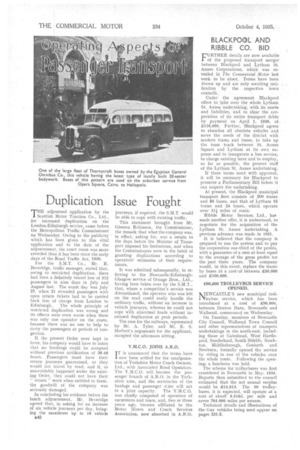Duplication Issue Fought
Page 56

If you've noticed an error in this article please click here to report it so we can fix it.
THE adjourned application by the Scottish Motor Traction Co., Ltd., for increased duplication on the London-Edinburgh service, came before the Metropolitan Traffic Commissioner on Wednesday. Owing to the publicity which has been given to this vital application and to the date of the adjournment, the court room was more crowded than it has been since the early days of the Road Traffic Act, 1930.
For the S.M.T. Co., Mr. R. Beveridge, traffic manager, stated that, owing to restricted duplication, there had been a definitely traced loss of 312 passengers in nine days in July and August last, The worst day was July 27, when 21 stranded passengers with open return tickets had to be carried back free of charge from London to Edinburgh. The whole principle of restricted duplication was wrong and its effects were even worse when there was only one operator on the route, because there was no one to help to carry the passengers at periods of congestion.
If the present Order were kept in force, his company would have to insist that no bookings could be accepted without previous notification of 36-48 hours. Passengers must have their return journeys guaranteed, or they would not travel by road, and if, as unavoidably happened under the existing Order, they could not have their " return " seats when entitled to them, the goodwill of the company was seriously damaged.
In concluding his evidence before the lunch adjournment, Mr. Beveridge agreed that, in asking for an increase of six vehicle journeys per day, bringing the maximum up to 16 vehicle B4.2 journeys, if required, the S.M.T. would be able to cope with existing traffic.
This statement brought from Mr. Gleeson Robinson, the Commissioner, the remark that what the company was, in effect, asking for, was a return to the days before the Minister of Transport imposed his limitations, and when the Commissioners were in the habit of granting duplications according to operators' estimates of their requirements.
It was admitted subsequently, in referring to the Newcastle-EdinburghGlasgow service of Orange Bros., Ltd., having been taken over by the S.M.T., that, where a competitor's service was discontinued, the operator who was left on the road could easily handle the ordinary traffic, without an increase in vehicle journeys, whereas he could not cope with abnormal loads without increased duplication at peak periods. The case for the railways, represented by Mr. A. Tyler, and Mr. E. S. Herbert's arguments for the applicant, occupied the afternoon sitting.
Y.M.C.O. JOINS A.R.O.
I T is announced that the terms have now been settled for the amalgamation of Yorkshire Motor Coach Owners, Ltd., with Associated Road Operators. The Y.M.C.O. will become the passenger branch of A.R.O. in the Yorkshire area, and the secretaries of the haulage and passenger sides will act in a joint capacity. The Y.M.C.O. was chiefly composed of operators of excursions and tours, and, two or three years ago, became affiliated to the Motor Hirers and Coach Services Association, now absorbed in A.R.O.
BLACKPOOL AND RIBBLE CO. BID
L-URTFIER details are now available
of the proposed transport merger between Blackpool and Lytham St. Annes Corporations, which was revealed in The Commercial Motor last week to be afoot.. Terms have been drawn up and are only awaiting ratification by the respective town councils.
Under the agreement Blackpool offers to take over the whole Lytham St. Annes undertaking, with its assets and liabilities, and to clear the corporation of its entire transport debts by payment on April 1, 1936, of. £116,000. Further, Blackpool agrees to abandon all obsolete vehicles and serve the needs of the district with modern trams and buses, to take up the tram track between St. Annes Square and Lytham at its own expense and to inaugurate a bus service, to charge existing fares and to employ, so far as possible, the present staff of the Lytham St. Annes undertaking.
If these terms meet with approval, it will be necessary for Blackpool to promote a Parliamentary Bill before it can acquire the undertaking.
At present, the Blackpool municipal transport fleet consists of 200 trams and 85 buses, and that of Lytham 55 trams and 24 buses, which operate over 11i miles of route.
Ribble Motor Services, Ltd., has made another offer, it is understood, to negotiate for the acquisition of the Lytham St. Annes undertaking. A previous advance was made in 1931.
It is believed that the company is prepared to run the system and to pay the corporation one-third of the profits, with a guarantee of a sum at least equal to the average of the gross profits for the past three years. The company would, in this event, replace the trams by buses at a cost4of between 250,000 and 2100,000.
290,000 TROLLEYBUS SERVICE OPENED.
NEWCASTLE'S new municipal trolt leybus service, which has been introduced at a cost of 290,000, between Denton Burn, Newcastle and Wallsend, commenced on Wednesday.
On Tuesday, members of Newcastle City Council, Wallsend Town Council and other representatives of transport undertakings in the north-east, including those at Gateshead, West Hartlepool, Sunderland, South Shields, Stockton, Middlesbrough, Gosforth and Newburn, formally opened the service by riding in one of the vehicles over the whole route. Following the opening, a luncheon was held.
The scheme for trolleybuses was first considered in Newcastle in May; 1934. Reports then submitted to the council estimated that the net annual surplus would be 214,813. The 30 trolleybuses, it is expected, will operate at a cost of about 9.516d. per mile and cover 764,400 miles per annum.
Technical details and illustrations of the Guy vehicles being used appear on pages 231-2.




























































































